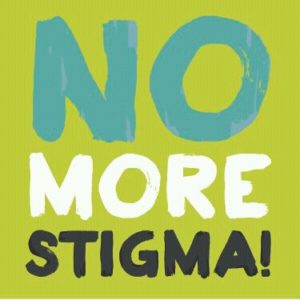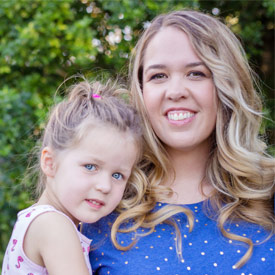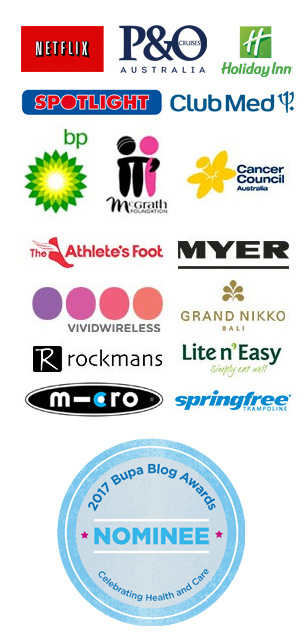We need to embrace these 6 simple words… “It’s Okay to Not Be Okay” because if we did, not only would the world be a better place, but reducing the stigma of mental illness would also naturally happen. And guess what? The world around us would start to accept mental illness just like any other illness. We wouldn’t have to lie. We wouldn’t have to hide. We wouldn’t have to be embarrassed. But rather… we could be proud. We could stand stall. We could be free.
My name is Angela Henderson and I am the owner of Australia’s leading baby/toddler/kids store Finlee and Me and I suffer from anxiety. I get anxious when I’m late, I’m normally at an appointment 30 minutes before hand, my brain is constantly thinking about things I can’t control , I write a million lists so I don’t forget something, I need to feel in control, I put pressure on myself to succeed at everything, I often try to do everything by myself and I swear that even when I’m asleep my brain is still going a million miles an hour.
Can anyone else relate?
Facts About Mental Illness in Australia
Did you know that:
- 1 in 5 Australians (20% or 20 out of every 100 people) will experience a mental illness in any given year. This number could actually be higher because so many Australians don’t reach out for help and therefore the data can’t be collected to give a more accurate reflection.
-
Mental illnesses are the third leading cause of disability burden in Australia, accounting for an estimated 27% of the total years lost due to disability.
-
Women are more likely than men to use services for mental health problems.
-
In 2013, the average deaths by suicide in Australia was 6.9 PER DAY!!!! To break this down in 2013, there were 1,885 males (16.4 per 100,000) and 637 females (5.5 per 100,000) died by suicide, a total of 2,522 deaths (10.9 per 100,000).
- There are more people who die from suicide then motor vehicle deaths in Australia. For example, in 2013 there were 1,193 deaths due to motor vehicle which means 1329 more people died from suicide. But yet the government funds more ads for road safety than they do for mental health; this doesn’t make sense to me (please note in no way am I saying less money should be spent on road safety awareness or that the lives lost to motor vehicle accidents is any less I’m just putting the data out there).
Mental Health Vs Other Health Concerns
Imagine this… you break your leg, have a heart attack, or you’re diagnosed with diabetes… can you please tell me any family member, friend, co-worker, neighbor or even your postman that will look at you and say “don’t worry about going to the doctor your leg will mend on it’s own, your diabetes just monitor it without insulin and as for your heart, you don’t really need to worry it will be ok. Umm… that’s a BIG fat HELL NO! Your family, friends etc would probably say something like: “do you need an ambulance? Do you want me to go with you? What can I do to help?” So why is it that those of us with mental health problems don’t get the same treatment? WHY? Let me repeat myself…. WHY?
Why does society look at us with mental health problems and think we’re weak? Or ask us questions like why can’t you just get over it? Why because mental illness is not spoken about, it’s taboo, it’s like top secret, but people we need to change this!! We have to change this!! We need to embrace mental health and start reducing the stigma of mental illness. It starts with you.
Reducing the Stigma of Mental Illness
There are a million things that can be done to assist in reducing the stigma of mental illness, but what can you do to help. I believe there are 5 simple things you can do assist:
- Educate your family, friends, co-workers etc about mental illness.
- Encourage your family, friends, co-workers etc to seek help if needed. Don’t just say… call a doctor. Play an active role. Ask them if you can go with them to see their GP, ask them if it would be ok for you to check in on them etc.
- Look for ways to keep the conversation going. What I mean by this is… if you see an article in your Facebook feed about mental illness share it on your page – maybe only one of your friends will read it but it might just be that one person you help and don’t even know about it.
- Listen. This is one of the hardest things to do as human beings as we liked to be heard, we want to be helpful. Just listen. Listen to your friend, family member etc. Make eye contact, nod your head and listen. Sometimes we don’t want answers, but rather want to be heard. Listen.
- Read. Don’t just believe what the media says. If something about mental illness comes up and you’re confused, then I encourage you to research what you might be confused on/scared of etc to gain a full understanding.
Seeking Help for Mental Illness
If you or a loved one is struggling with a mental illness, PLEASE seek help as there are many professionals out there that would like to assist. Here are a few places in Australia you can contact:
- If you feel an immediate risk (wanting to hurt yourself or others) please contact 000 and an ambulance can assist asap.
- If you not at immediate risk, arrange to meet with your GP. Your GP normally has a great relationship/rapport with you and will be able to explore a mental health care plan to go and talk with someone, explore medication options, explore your diet, will look at anything physical to see if you have anything physical underlying that maybe contributing to your mental health etc.
- If you don’t have a GP you trust, you can always ring or walk in to your local Integrated Mental Health office and they will be able to assist too.
- If you’d like to chat with someone you can contact Lifeline on 13 11 14
My name is Angela Henderson and I have anxiety. But… I also am: a great mother. A great wife. A great daughter. A great friend. A great worker. And I’ve learned that “It’s Okay to Not Be Okay” and to ask for help. Start reducing the stigma of mental illness in our community today and you can start by sharing this article.
Love to all – Angela from Finlee and Me xoxo
References:
http://www.abc.net.au/news/2014-01-01/national-road-tolls-2013/5181358
http://www.mindframe-media.info/for-media/reporting-mental-illness/facts-and-stats#sthash.5YXm7UlH.dpuf





